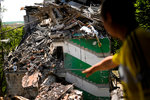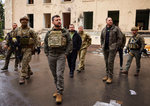

KRAMATORSK, Ukraine (AP) — Russian troops pushed farther into a key eastern Ukrainian city and fought street by street with Kyiv's forces Monday in a battle the mayor said has left the city in ruins and driven tens of thousands of people from their homes.
Military analysts painted the fight for Sievierodonetsk as part of a race against time for the Kremlin. The city is key to Russian efforts to complete the capture of the eastern industrial region of the Donbas quickly — before more Western arms arrive to bolster Ukraine’s defense.
Weapons from the West have already helped Kyiv's forces thwart a Russian advance on the capital in the early weeks of the war. That failure forced Moscow to withdraw, regroup, and pursue the more limited objective of seizing the Donbas, where Moscow-backed separatists already held swaths of territory and have been fighting Ukrainian troops for eight years.
“The Kremlin has reckoned that it can’t afford to waste time and should use the last chance to extend the separatist-controlled territory because the arrival of Western weapons in Ukraine could make it impossible," Ukrainian military analyst Oleh Zhdanov said.
But in a potential setback for Ukraine, President Joe Biden appeared to dismiss reports that the U.S. was considering sending long-range rocket systems to the country.
The Russian focus on Sievierodonetsk has already left the city "completely ruined," Mayor Oleksandr Striuk said. Artillery barrages have destroyed critical infrastructure and damaged 90% of the buildings, and power and communications have been largely cut to a city that was once home to 100,000 people.
“The number of victims is rising every hour, but we are unable to count the dead and the wounded amid the street fighting,” Striuk told The Associated Press in a phone interview, adding that Moscow’s troops advanced a few more blocks toward the city center.
He said that only about 12,000 to 13,000 residents remain, sheltering in basements and bunkers to escape the Russian bombardment — a situation that recalls the siege of Mariupol that trapped residents and led to some of the worst suffering of the war.
Striuk estimated that 1,500 civilians have died in his city since the war began, from Russian attacks as well as from the dire conditions, including a lack of medicine or medical treatment. More than 20,000 are feared dead in Mariupol.
A 32-year-old French journalist, Frédéric Leclerc-Imhoff, died Monday near Sievierodonetsk when he was hit by shrapnel from shelling while covering Ukrainians evacuating the area, according to his employer, French broadcaster BFM TV.
Meanwhile, the Ukrainian military said Russian forces reinforced their positions on the northeastern and southeastern outskirts of Sievierodonetsk, 90 miles south of the Russian border in an area that is the last pocket of Ukrainian government control in Luhansk.
Luhansk Gov. Serhiy Haidai said the Russians were also pushing toward nearby Lysychansk. In addition to the journalist, two civilians were killed and another five were wounded in the latest Russian shelling, he said.
The Russian advance in Sievierodonetsk and Lysychansk on either side of the strategically important Siverskiy Donetsk River is part of an all-out push, Zhdanov said.
The intensity of the latest fighting and the fact that Russia has poured troops in from their far east have come as a surprise to the Ukrainians, who are trying to hold out until more weapons can arrive, Zhdanov said.
“The Ukrainian army can’t afford losing as many soldiers as the Russians," Zhdanov said. "The Ukrainians hope that Russia will run out of steam soon.”
The Russians are taking advantage of the slow delivery of additional weapons and make up for difficulties its forces had early in the war, said Mykola Sunhurovskyi, a military expert at the Kyiv-based Razumkov Center think tank.
“Russia clearly has been trying to take revenge for its past failures in Ukraine and achieve at least some of its goals," Sunhurovskyi said.
On Monday, Biden told reporters outside the White House that there are no plans for the U.S. to send long-range rocket systems to Ukraine, amid reports that the move is being considered.
Dmitry Medvedev, the deputy head of Russia’s Security Council, said that was a “reasonable” decision.
He said that “otherwise, if our cities come under attack, the Russian armed forces would fulfill their threat and strike the centers where such criminal decisions are made.”
Medvedev added that “some of them aren’t in Kyiv.”
Russian pressure also continued in the south on Monday. Defense Ministry spokesman Maj. Gen. Igor Konashenkov said an artillery strike on a shipyard in the southern port of Mykolaiv destroyed Ukrainian armored vehicles parked there.
In the Kherson region, the Russia-installed deputy head of the regional administration, Kirill Stremousov, told Russia’s Tass state news agency that grain from last year’s harvest is being delivered to Russian buyers, adding that “obviously there is a lot of grain here.” Ukraine has accused Russia of looting grain from territories its forces hold, and the U.S. has alleged Moscow is jeopardizing global food supplies by preventing Ukraine from exporting its harvest.
Russia, meanwhile, has pressed the West to lift sanctions against it as it seeks to shift the blame for the growing food crisis — which has led to skyrocketing prices in Africa.
Ukrainian President Volodymyr Zelenskyy urged France not to succumb to such “blackmail” at a meeting Monday with French Foreign Minister Catherine Colonna.
Zelenskyy has urged the European Union to in fact ramp up its sanctions against Russia, especially on its lucrative energy sector. He was set to address a gathering of EU leaders that is wrestling with whether to target Russian oil in a new set of sanctions.
___
Karmanau reported from Lviv. AP journalists around the world contributed to this report.